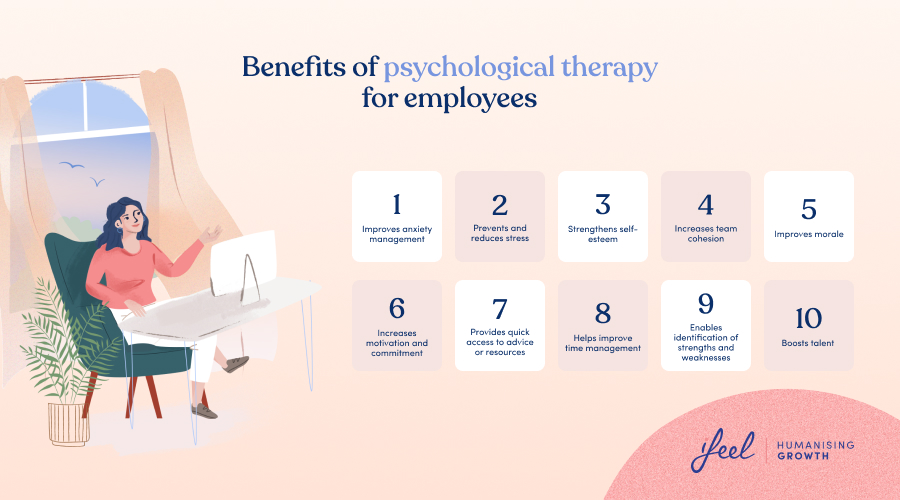Content
ToggleThe idea of addressing employee mental health as an essential element of any corporate strategy is not a trend but a reality that can no longer be avoided. If someone still is not clear about it, we can ask: How do you work better when you are motivated or demotivated? Acknowledged or invisible? Bored or interested? Overworked or rested?
We could go on forever with these questions, but the answers would all point in the same direction: the better the mental health of employees, the better their performance.
If we add to this the importance of not having high levels of workplace anxiety, not suffering from depression, or being under situations of excessive stress and mobbing, the answer continues to indicate an inescapable truth. Which is? That employee’s mental health is their main work tool and is as important or more important for productivity than their talent or the material conditions they have to perform their tasks.

Talking about stress and breaks: perhaps it is time to consider whether, as managers, we encourage and facilitate our team members to take the breaks they need, bearing in mind that the frequency, duration, and content of these intervals must be appropriate. Also, as individuals, we should all adopt good organizational routines, not only to maintain an orderly organization of tasks but also to combine those tasks with appropriate breaks, especially when we are subjected to frequent multitasking dynamics.
It is important to keep in mind that multitasking can be advantageous and useful for employee mental health. However, we must learn to evaluate better how many work fronts we have open at the same time so that our system does not overload itself in the form of stress, anxiety, and, of course, mistakes in performance.
Prioritise employee mental health
How can we take care of employee mental health? It is not a matter of trivializing this idea, as if we were talking about turning the company into a psychiatrist’s office. Simply analyze the issue from a purely economic point of view. This makes it easy to understand that the better the employees do psychologically, the better the results of the company they work for will be.
According to Dévora Kestel, psychologist and director of the Department of Mental Health and Substance Abuse from the World Health Organization, “lost productivity related to depression and anxiety, two of the most common mental disorders, is estimated to cost the global economy $1 trillion annually.”
Among the factors that, in the judgment of this expert, have the worst impact on employee mental health are “poor communication and management practices, limited participation in decision making, long or inflexible working hours, and a lack of team cohesion”.
There are still many changes to be implemented. Nevertheless, sensitivity to this issue is increasingly gaining ground at different levels of corporate power.
As in previous editions, the World Economic Forum’s annual meeting in Singapore last January included up to seven conferences to address the issue of employee mental health, as well as a presentation entitled “Prioritizing Workplace Mental Health,” which analyzed the influence of the Covid-19 pandemic on mental health and the importance of putting this issue on the corporate agenda.
It is, therefore, being progressively understood that the best business strategy to care for employee mental health is the one that has to do with long-term, humanized, and truly intelligent efficiency, instead of pursuing excessive and raw productivity that ends up generating huge annual losses caused by absenteeism and sick leave due to mental health problems.

What is the best way to take care of employee mental health?
It is an important question that all employees should ask themselves, especially if they have any responsibility in HR, Human Capital Management, or occupational health in general within our company.
Each company is different because it has different objectives, material and HR resources, and corporate culture. These greatly influence the decisions made regarding employee mental health.
On the other hand, each employee is unique: We all have our own characteristics, expectations, and needs regarding work. Each of us has particular resources and vulnerabilities that need to be taken into account when it comes to fostering our psychological well-being.
Where to begin?
As mentioned above, taking care of the physical environment, even the one closest to us (our own desk, for example, or our desktop) is a crucial starting point when it comes to boosting employee mental health. Furthermore, although not everyone gives it importance, aspects such as the distribution of furniture, decoration, light, temperature, etc. clearly influence our motivation and performance.
Another fundamental aspect to consider when analyzing employee mental health is relationships, either with our teammates or with colleagues who belong to other hierarchical levels within the company (our bosses and, if we have them, our subordinates). A room can be very nice and a task can be very interesting but, at the end of the day, if human relations fail, the employee’s mental health is affected.
Join the global leading solution in mental well-being
Keep communication alive
At a corporate level, we must consider these and other aspects in our psychological well-being strategy. To do so, it is important to keep efficient communication channels open within the workforce to generate a sense of efficiency, cohesion, and transparency.
It is also about the people in charge of managing the HR area obtaining useful information about the needs and characteristics of our workforce at any given time. These needs and characteristics are not organized exactly as Maslow’s famous pyramid would indicate.
In reality, they follow their own logic, they change over time, hence the strategy to boost employee mental health, as well as those aimed at providing social benefits and strengthening the emotional salary must be vivid and flexible instruments that allow the company to adapt to the transformations that naturally occur among the people who form part of it.
Of course, this is of great importance when considering inbound recruiting and talent development and retention strategies.
Preventing risks is important and useful
The dangers of boreout (deep and continuous boredom and demotivation), burnout (which is famous for the syndrome of the exhausted employee and, therefore, with poor psychological and probably also physical health), toxic competitiveness within a team as a consequence of its lack of cohesion, are there and are combined with other psychosocial risk factors that companies are obliged to identify, measure, prevent and address.
This requires making a series of corporate and strategic decisions aimed not only at taking care of the employee’s mental health for the sake of it (even if doing so is good in itself) but also at generating a new way of taking care of productivity and positioning themselves in the work models demanded by the current labor market situation.
Benefits of boosting employee mental health
Mental health programmes for companies have multiple benefits for employees.

In any case, within the diversity of benefits to be expected, it is possible to summarise them all in one general benefit: corporate mental health programmes are useful for the companies that implement them because they significantly improve the employee experience as perceived by staff members, through increased or improved motivation, relaxation, team cohesion and employee commitment to the company.
Mental well-being for companies
At ifeel, we understand that it is not possible to take care of the company without taking care of the psychological well-being of its employees. To do so, we have a mental well-being solution for companies, designed by our team of occupational well-being psychologists with one main objective: to help companies place employee health at the center of their strategy to build their mission statement.
Thanks to this partnership, the people in charge of HR departments can receive personalized, data-driven advice on how to make good decisions in a company to get the most out of the teams they are in charge of and take better care of the psychological well-being of the people in them.
Moreover, this program offers employees a holistic mental health care service structured at different levels according to their needs. This service includes, if required, online psychological therapy with a psychologist specialized in cases like theirs. Try our program today so you can see how it could help you.
We hope you have found this post about employee mental health useful. If you want more information about our mental well-being solution for companies, simply request it and we will contact your team as soon as possible.













